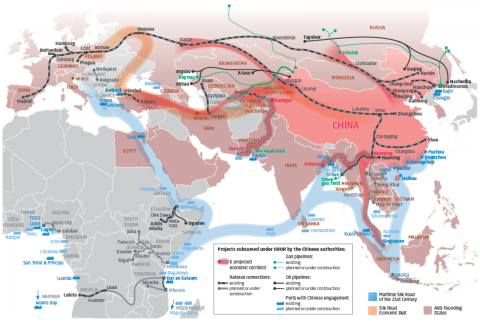China, as an alternative leader to the global economic affairs.
more_resources

Announced in 2013 by Xi Jinping, the Belt and Road initiative ( “One Belt, One Road,” or OBOR) put China as an alternative leader to the global economic affairs scenario.
Idealized as a New Silk Road, it aims to promote development by construction and expansion of high-speed rail networks, pipelines, ports and logistics centers, basically a Pan-Asian network linking China to Southeast Asia, consisting of two main components: an overland Silk Road Economic Belt connecting China with Central Asia and beyond, and an ocean-based 21st Century Maritime Silk Road to China’s south.
Based on hard power strategy, using the infrastructure development and expansion in roughly 65 countries by land and by sea, through transport networks, telecoms, energy pipelines and industrial hubs, comprising about 70% of the world’s population and the investments approaching $4 trillion, it leads all roads to Beijing, making Eurasia (dominated by China) an economic and trading area to rival the transatlantic one (dominated by America).
"We hope to unleash new economic forces for global growth, build new platforms for global development, and rebalance globalization so that humanity will come closer to a common destination community," said Chinese President Xi Jinping on opening at the international forum called the New Silk Road.
Thus, by investing in volatile countries in central Asia, Mr Xi expects to create a more stable neighbourhood for China’s own restive western provinces of Xinjiang and Tibet. And by encouraging more Chinese projects around the South China Sea, he expects the initiative bolster China’s claims in that area, opening doors to new markets for Chinese companies, such as high-speed rail firms, and to export some of his country’s vast excess capacity in cement, steel and other metals.
OBOR also matures the idea that the current unbalanced global trading system based on US dollar needs to be reformulated. So, there is a need of a "super currency" created by the International Monetary Fund (IMF), therefore with OBOR achievement, Mr Xi gains strength to defend its position as an international influence, as well to receive foreign direct investment (FDI).
Beyond the hard power strategy he also expect to demonstrate how the initiative can serve as an integrative platform for coordinating China’s “alphabet soup” of initiatives—such as the Shanghai Cooperation Organization (SCO), the Brazil, Russia, India, China, and South Africa (BRICS) forum, and the Forum on China-Africa Cooperation (FOCAC).
Demonstrating them the soft-power message of China, an innovative country, mighty but peaceful, and delivering what it can do to the world in exchanges of mutual benefit, by agreements or even by academic exchanges, technology transfer and incentives for start-ups. Not only by wish but by necessity, to answer sorts to some of its economic problems, as well to stabilize the unslakable thirst for infrastructure in Asia and the world’s poverty.
